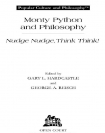Monty Python and Philosophy, Gary Hardcastle [portable ebook reader TXT] 📗

- Author: Gary Hardcastle
Book online «Monty Python and Philosophy, Gary Hardcastle [portable ebook reader TXT] 📗». Author Gary Hardcastle
But that’s just the start. That talk not only went well; people loved it. In fact, the club requested the talk for the following semester, and each year after that. And word traveled. I sent a videotape of its inaugural delivery to my Ph.D. advisor (who, having braved uncountably many dry-as-dust dissertations, himself pined for the fabled Monty Python tome), and he showed it to others. Soon I was giving the talk at other universities, sometimes to their philosophy department and sometimes to their philosophy club. Its text showed up on the internet (Python fans, truth be told, are a bit geekish) and I began receiving email from Pythonites and fellow philosophers. A few years later, when I found myself in the great American Midwest (aka Wisconsin) I asked the Wisconsin Humanities Council if ordinary Wisconsinites might enjoy this sort of thing, and soon I was showing Monty Python clips and talking about holism, rationality, and philosophy in libraries, schools, and the occasional church basement across the Dairy State. It continues; as I write, I’m scheduled to talk about philosophy and Monty Python in Harrisburg, Pennsylvania, next week, as part of an Honors Lecture Series. This sixtieth or so delivery will be as much fun as the others. I may do this well into retirement.
So here’s a question: what has made this talk such a hit? It’s not, I think, merely that it offers a way to see some Monty Python clips; these are readily available without the trouble or expense of having me show them. Nor do I think it’s anything to do with me, since nearly all the people that come to see the talk don’t know me from Professor Gumby. What is it, then, about this talk’s juxtaposition of philosophy and Monty Python that makes it appealing to so many? Here’s a successful mix of popular culture and something quite definitely detached from popular culture, analytic philosophy. What’s behind the success? And what might that tell us about philosophy, or about Monty Python?
Hume’s Gap
That gap that I just mentioned between popular culture and philosophy has been around, it appears, for some time. It’s the starting point the Scottish philosopher David Hume chose for his 1748 essay, An Enquiry Concerning Human Understanding, although Hume described it as a gap as between two “manners” of philosophy. The first of these, the “easy and obvious philosophy,” Hume said, devotes itself to getting people to feel and, thus, to act. Such philosophy, according to Hume (feel free to read this in a rich Scottish brogue), “make[s] us feel the difference between vice and virtue; [it] excite[s] and regulate[s] our sentiments” (p. 1). Now this sort of thing is still with us; indeed, attempts to excite and regulate our sentiments are nearly everywhere, from TV to radio to books and magazines to advertising to greeting cards. Make no mistake; it is thoroughly entertaining stuff, gripping, even, and (in moving us to act—to laugh, cry, applaud, protest, vote, or spend money) stunningly successful. We love it. Of course, we don’t call it ‘philosophy’ anymore; we call it popular culture. And it includes Monty Python.
Hume’s other manner of philosophy is the sort of thing that today goes by the name ‘philosophy’. This “accurate and abstruse philosophy,” as Hume called it, “regard[s] human nature as a subject of speculation; and . . . examine[s] it, in order to find those principles, which regulate our understanding, excite our sentiments, and make us approve or blame any particular object” (p. 1). In a nutshell, then, the “accurate and abstruse” philosophy is about figuring out why people get excited and move, while the “easy and obvious” philosophy is about actually exciting and moving them.
Given that description, it’s no surprise when Hume goes on to note that all the excitement (not to mention the fame and wealth) attaches itself to





Comments (0)